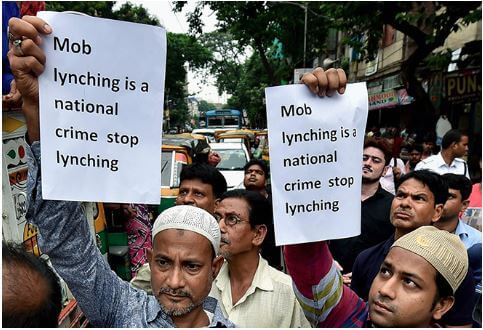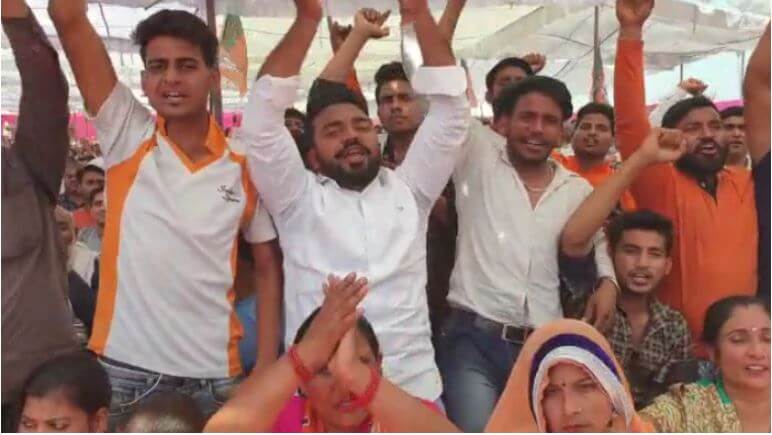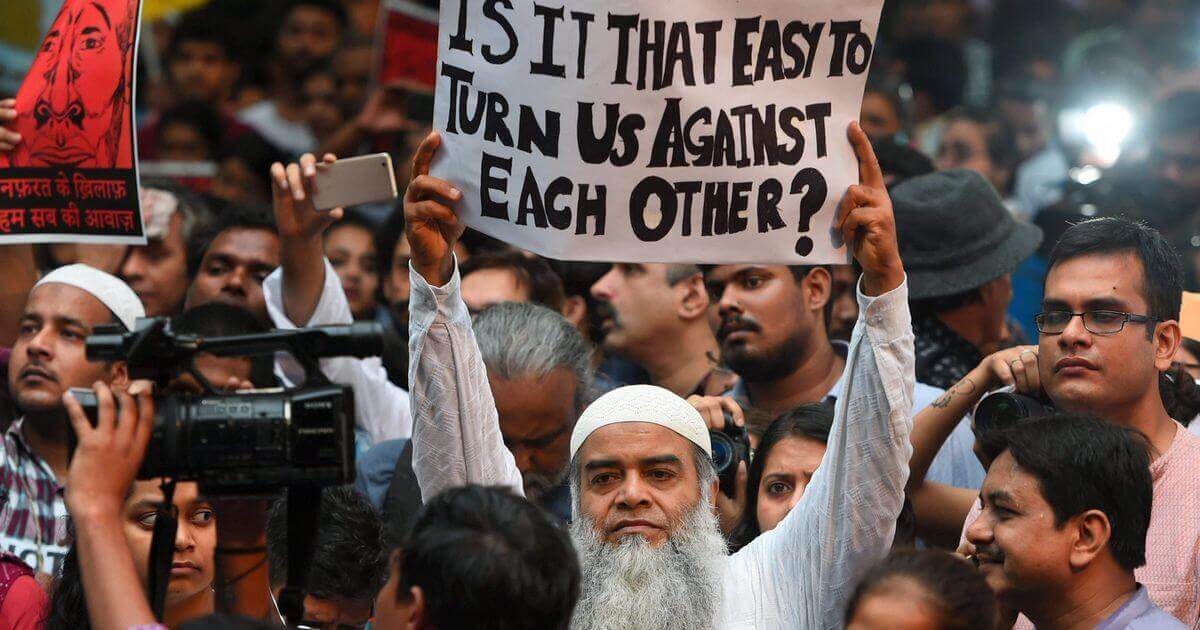28 September 2015: A Muslim man called Mohammed Akhlaq was dragged out of his home and lynched to death by a Hindu mob in UP's Bisara village, about 45 kilometres from New Delhi, after a rapidly-spreading rumour that he and his family killed and ate a cow that went missing from the neighbourhood.
22 June 2017: Muslim teen Junaid was returning home to his village in Faridabad on a train with his brothers Hashim and Sakir when they were attacked and stabbed multiple times by a mob. Reports said the fight broke out over a seat and that the brothers were thrashed on rumors of beef consumption. While Hashim and Sakir survived, Junaid died of multiple stab wounds.
27 June 2017: Otera Bibi, a woman in her 40s, was lynched in Sekendra by a mob who accused her of being a child-lifter. An Indian Express report said she was tied to a vehicle and thrashed with sticks. Some also pelted stones at the woman, who was believed to be mentally ill. She succumbed to her injuries at a sub-divisional hospital.
8 June 2018: Two men, Nilotpal Das and Abhijeet Nath were beaten to death on suspicion of being child-lifters.
18 June 2019: 22-year-old Tabrez Ansari was accused of stealing a motorcycle died in Jharkhand four days after allegedly being beaten up by a mob and forced to chant ‘Jai Sri Ram’ and ‘Jai Hanuman’.
Earlier this month, Rashtriya Swayamsevak Sangh (RSS) Chief Mohan Bhagwat made a rather absurd statement. According to him, sporadic violence in a few areas should not be termed as lynching as this would malign the reputation of the country and a foreign word like “lynching” is too big a word to define minor cases of belligerence. However, the surge in mob lynching over the last five years states otherwise. With the Bhartiya Janata Party (BJP) coming to power, the country has seen a humongous rise in lynching incidents of almost 226 from only 22 between 2009 to 2013. According to the database released by FactChecker.in, Muslims, who constitute “14% of India’s population, were victims in 60% of hate crimes; Christians, 2% of the population, in 14% cases; and Hindus, 79.8% of the population, in 14% cases.” According to the National Crime Records Bureau (NCRB) reports on crime in India, 623 women being declared as ‘witch’ were killed between 2001 and 2016. After the NCRB stopped publishing reports in 2016, many cases have been hidden from the public eye.

Source: Observer Research Foundation
The aforementioned cases are only a few of those that have made it to the limelight. There are many others which do not make it to the headlines or on the front page of our news feeds, but this does not nullify the fact that the vicious practice of lynching is a prevalent and existing evil in India, no matter how much national leaders try to avoid its presence. What is even more dangerous is that such activities have become so regular, as though innate, that it has become the new normal for the mob to intervene in matters, mostly even without understanding the issue.
Lynching is defined as a form of violence in which a mob, under the pretext of administering justice without trial, execute a presumed offender, often after inflicting torture and corporal mutilation, targetting mainly individuals and groups from religious and caste minorities. The spread of fake news and rumour-mongering through social media have been the driving forces behind the increase in lynching. Tales of so-called love jihad, cow vigilantism, anti-nationalism, beef-eating, mere child lifting suspicions, and other superstitious beliefs have stimulated the mob to take actions on their own. According to the reports produced by IndiaSpend, Uttar Pradesh records the highest number of incidents of mob lynching, followed by Karnataka. After Muslims, Dalits have become the second-most targeted victims. The National Human Rights Commission registered 2,008 cases between 2016 and 2019 of exploitation and lynching of minorities and Dalits. Uttar Pradesh alone accounted for 869 cases of these cases. However, as Uttar Pradesh Chief Minister Yogi Adityanath claims, the state has been free of lynching and riots for over 2.5 years under his tenure.
In the current scenario, speaking against lynching has become a greater crime than lynching itself. Recently, a First Information Report was lodged against nearly 50 celebrities and academicians, including Aparna Sen, Ramachandra Guha and Mani Ratnam among others in Muzaffarpur (Bihar) for penning an open letter to Prime Minister Narendra Modi raising concerns on the soaring mob lynching against Muslims and minorities. The acceptance of this FIR itself violates Article 19 (freedom of speech and expression) of the Indian Constitution, and although it was later dismissed in court, the widespread support of this move by the masses is concerning. Assessing the contemporary scene of the country, it seems to be gradually sliding towards majoritarianism, despite the tried-and-tested fact that a diverse country like India is not suitable for the same. History has witnessed that such a setting has only worsened communal stress, the gruesome partition being the most prominent example. Against this backdrop, present India is still undergoing the repercussions in Kashmir. As the nation gradually shifts towards majoritarianism, a multicultural India will not last in the long run if the current environment persists.
In other news, 12-year-old girl Roshni and her 10-year old nephew Avinash from a Dalit family in Shivpuri district’s village Bhavkhedi (Madhya Pradesh) were the latest victims of lynching by two men for defecating in the open. Different news channels have interpreted this from different standpoints. While some have looked at it as the failure of the government to implement their much-famed open defecation policy, others look at it from the viewpoint of the evil and still prevalent caste system in the country. The father of one of the two Dalit children alleged they were facing discrimination over their caste. Amid all this blame game, the main concern has gone off-track: the merciless killing of two innocent children by two people of sound mind. And the absurdity does not end here. What is even more appalling is that to justify his horrendous actions, one of the accused said he was “commanded by God to kill demons”.
The purpose of this excerpt is mainly to call attention to the ghastly practice of lynching and bring to light the ignorance that surrounds such customs under the guise of sporadic violence. It also aims to signify the future of a secular India, which is slowly losing its gravity.
A state of anarchy?
The current situation reflects that there is more fear of lynch mobs than the law itself. The legitimacy of the Constitution and the rule of law, which form the supreme authority of the country, seems to be diminishing with time. Internal conflicts among judges, allegations of sexual harassment, an apprehension that many culprits go unpunished or are acquitted have resulted in the public losing their trust in the apex institution of the government, and rightfully so. The accused in Junaid Khan’s murder was granted bail by the Punjab and Haryana High Court stating that the initial dispute between the victims and the accused was “only regarding the seat-sharing and abuses in the name of castes and nothing more”. On August 14, all six accused in the Pehlu Khan lynching case were acquitted by a Rajasthan court based on the negligent investigation by the police.
Talking about the police, the guardians of law and order in society, a report by Delhi-based NGO Common Cause and CSDS underscores disheartening revelation. “35% of police personnel interviewed for the survey think it is natural for a mob to punish the culprit in cases of cow slaughter, and 43% think it is natural for a mob to punish someone accused of rape.” With such an outlook, it does not come as a surprise that hardly any development has been made to prevent and act against lynching, so much so in 5% of the cases, there has been no record of arrest of the accused, often with manipulation of the incident. In Tabrez Ansari lynching case, for instance, the Jharkhand Police dropped the murder charge against 11 accused claiming that the victim had died of a cardiac arrest and was not murdered. The accused will now face the law for a lesser offense under section 304 of IPC (culpable homicide not amounting to murder).
Due to differing synergy in the discharge of responsibilities by both the authorities and the public, the practice of lynching has ceased to erase. When people take the law into their own hands, there is chaos and lawlessness, compromising the civilities of a larger society. The feeling of sectarianism has penetrated deeply in Indian society. To add on, with the alienation of North-Eastern states from the rest of the country, exploitation of minorities and the current situation in Kashmir the future of a secular, multicultural and harmonious India looks vague.
Legislation dealing with lynching
At present, there is no formal law against lynching except for Section 223(a) of the Criminal Procedure Code, 1973, which provides for a joint trial of several persons in certain specified cases because of some basic connection between the various offences committed by them. However, lynching based on identity discrimination (Muslims, Dalits, minorities) directly violates Article 14 (equality before law) and Article 15 (no discrimination on grounds of religion, race, caste, sex or place of birth). The Scheduled Caste and Scheduled Tribe (Prevention of Atrocities) Act, 1989 also lists 22 offences that reflect crimes against the SC/ST persons.
However, the prejudices in the functioning of the government make it easy for the offenders to get away with their crimes, with politicians acquainting with the offenders. For instance, one of the accused in the Mohammed Akhlaq lynching case was seen in a Bharatiya Janata Party (BJP) rally in Bisada village in Uttar Pradesh's Greater Noida addressed by Uttar Pradesh Chief Minister Yogi Adityanath.

Mohammed Akhlaq lynching accused was seen in the front row and chanting "Yogi Yogi" in a rally. Source: India Today
The Supreme Court recently issued a notice to the Centre, the National Human Rights Commission (NHRC) and the State governments to a plea seeking the implementation of its July 2018 judgment which laid down several preventive, remedial and punitive measures to combat the crime of lynching, included setting up of fast track courts, stopping hate messages on social media, giving compensation to victims and bringing in a law to define and curb mob lynchings. The bench which comprised of Chief Justice Dipak Mishra and Justices A.M. Khanwilkar and D.Y. Chandrachud, asked the Parliament to form an independent penal category for the offence of lynching with deterrent penalties to instil fear for law amongst the people who involve themselves in such activities. asking state governments to appoint nodal police officers in every district to identify vulnerable areas; collect intelligence on individuals or groups indulging in hate speeches and take steps to prevent the dissemination of rumours through social media. However, only a few states have acted upon it.
In July 2019, the State Law Commission of UP recommended jail terms ranging from seven years to life imprisonment for those convicted for mob lynching. In its draft legislation, the commission also recommended, “up to three-year term for dereliction of duty by a police officer or a district magistrate.” On 5 August 2019, the Rajasthan Assembly passed the Rajasthan Protection from Lynching Bill which provides life imprisonment and a fine from INR 1 lakh up to INR 5 lakh to those convicted in cases of fatal mob lynching. Similarly, on August 30, the West Bengal Assembly passed a bill to prevent and punish mob assaults and lynching. The West Bengal (Prevention of Lynching) Bill, 2019 proposes a jail term from three years to life for those involved in assaulting and injuring a person and also defines terms such as “lynching” and “mob”. The State also proposed the West Bengal Lynching Compensation Scheme
However, there is a need for centralized legislation on laws to curb lynching. A Group of Ministers (GoM) was constituted last year to combat lynching. The Union Home Minister Amit Shah has taken over the charge to head the group. However, ever since its formation, no substantial progress has been made. India could take an example from the United States. The latter has seen a large number of lynching cases of African Americans, especially between 1892 to 1896. With gradual progress, the Senate finally managed to combat lynching by unanimously approving a bill in December, 2018 that declares lynching a federal crime.
Assessment
As the country awaits for the much-awaited verdicts of the cases mentioned above, we must understand that lynching is real and it is not going away soon. Hardly any significant measures have been adopted to restrain lynching. It has been implicitly encouraged by supporting the actions of the accused either by calling it a gimmick to defame the Hindus or making absurd statements comparing the existence of the practice to mere violence. There has been a lack of speedy legal remedies, absence of due police intervention and even connivance in BJP ruled states. The police have also failed to perform their duties fairly. E.g., in Tabrez Ansari's case, the police recorded his confession for the theft but nowhere mentioned the assault on him. It also will not make much of a difference blaming the government, political parties or the police. The indifference of the police is apparent but to blame them gives an assurance to the offenders that they can get away with their hooliganism.
As citizens, we have an even bigger responsibility and it is us who can bring a change. To condemn any form of violence would be number 1. Being the most important legal member of the nation, it is our responsibility to maintain the sanctity of the Constitution, the supreme law of the land, and that every action is followed accordingly. It is us who will have to decide what kind of country we want to live in. Therefore, everyone, irrespective of religious affiliation or castes should work to build a nation where diversity is respected and maintained. The public should be mobilized against these crimes against humanity and that punishing the culprit, no matter how grave and heinous the alleged crime, is not the duty of the citizens. We take pride in being the largest democracy in the world. The day we start to act upon it, the rest will follow.
References
Admin. (2018, August 7). Why we need a special law to curb mob lynching. Retrieved from https://www.orfonline.org/expert-speak/42867-why-need-special-law-curb-mob-lynching/?amp.
Banerjee, S. (2019, October 8). Lynching alien to India, says RSS chief Mohan Bhagwat. Retrieved from https://www.thehindu.com/news/national/rss-chief-says-lynching-is-a-western-construct/article29616428.ece.
Who is using WhatsApp as a murder weapon? (2018, July 9). Retrieved from https://www.scmp.com/week-asia/society/article/2154436/indias-lynching-app-who-using-whatsapp-murder-weapon.
Quint. (n.d.). Hunted - India's Lynch Files. Retrieved from https://www.thequint.com/quintlab/lynching-in-india/.

